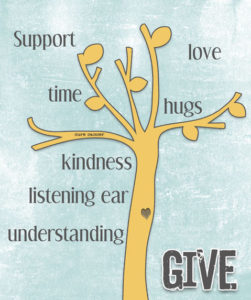 When we use social communication tools like Facebook or Twitter, it feels like everything we do risks becoming public knowledge. News services warn audiences about burglars targeting houses of people who post vacation pictures. Or how Facebook’s helpful photo-tagging feature invades your privacy. But when it comes to supporting your friends and family during rough times, social media is not as public as you might think.
When we use social communication tools like Facebook or Twitter, it feels like everything we do risks becoming public knowledge. News services warn audiences about burglars targeting houses of people who post vacation pictures. Or how Facebook’s helpful photo-tagging feature invades your privacy. But when it comes to supporting your friends and family during rough times, social media is not as public as you might think.
Social media can be hit or miss
For getting information out, social media do a fairly good job, but they are often hit or miss. There’s nothing worse than reaching out to a friend only to find out that they’re going through something difficult and you had no idea. But this happens more frequently than you realize. Half of Facebook users have over 200 friends. That is a lot of posts to read, even if you don’t keep in touch every day. To help with this, social media are designed to put the most important posts in front of your face as soon as you check in. But how do they decide what post is the most important?
For Facebook, it’s a “constantly shifting formula” that is influenced by what you have clicked on, and what other people have clicked on. For example, of one of your friends posts a picture that gets a large number of “Likes” or comments from mutual friends, you might be more likely to see it on your newsfeed, but algorithms can only guess and they don’t always get it right.
When you are sharing personal information – an accidental injury, the passing of a family member, or a medical diagnosis – social media might seem like an easy solution. You think you can get the word out to your friends and family and they will be able to work together to help support you. However, there a strong chance that your friends and family won’t see your announcement. Even if they do see it, coordinating long-term support is not easily accomplished via social networks.
Social media connections can be weak and ineffective
When it comes to coordinating groups of people, social media have their limitations. Using the civil rights movement as an example, Malcolm Gladwell talks about how the weak ties of social media are not as motivating as the strong ties of connection between close friends and family. He argues that clicking “like” on a post is not going to make a significant impact, whereas getting out and doing something for another person can change their life.
When you need extra support, don’t expect social media to reach everyone, or to effectively rally and organize your friends. It’s not a great medium for that. Instead, use support tools like Flower, and help your friends and family coordinate support that will make a real difference to you.

